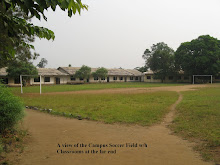Monday, December 21, 2009
Vocational Training: Is it still useful in today's society?
By definition, vocational training places emphasis on training for a specific trade or career, with a focus on practical applications. It is generally not concerned with theory or traditional academic skill training. In other words, vocational training produces a link between education and the working world with a larger part of such training considered hands-on. In Cameroon as most developing countries, vocational training is offered in technical schools like Vocast, Ombe, Fess technical college and the numerous government technical schools all over the country today.
A holistic overview of vocational training in modern times tends to make us ponder if it is still useful in today’s society. Has this type of training outlived its value and are young people getting a commensurate return in their financial investment, time and future career goals? Since vocational training begins in secondary schools and increasingly called career and technical education, its concept connotates a narrow definition. We therefore begin to wonder if such training needs to be expanded and not too focused. The curriculum and course selection should give students the opportunity to explore career options which will not only prepare them for semi skilled jobs but flexibility for advanced education. The problem is the present curriculum in these schools falls short of developing academic skills in business, new computer technologies, and health sciences and so on. It is therefore imperative that the traditional focus of training in such fields as carpentry, masonry, auto mechanic and electronics should move into a broader concept with training in natural and social sciences thereby integrating academic and vocational training. This type of integration will further allow students trained at the vocational level to transition seamlessly to University and polytechnics with a wider career choice.
With a changing technologically inclined society and global competitiveness, vocational schools across Cameroon can increase leverage in student retention, graduation and compete effectively with non vocational schools through added course work in English, mathematics and sciences. Students should cast a wider net of course selection that prepares them not only for end of program exams like CAP/City and Guilds but the General certificate of education.
There is no doubt that education of all kinds is known to be a reliable engine for success and growth. It creates opportunities and puts the impossible within the reach of a child from the poorest family. In the past, vocational training was the kind of education that was directly relevant to quick employment. It was also the fastest turnaround from classroom to paycheck for most young people. However, with falling standards of education and the move from manufacturing to the service industry, that dream is now far fetch for many and no longer realistic. Young people attending vocational schools should therefore be offered a balanced education with a blend of general education in addition to their passion for hands on training. Whoever said a child graduating from a vocational school should not aspire to become a lawyer or medical doctor if he/she so chooses.
About the Author:
Simon Etta graduated from Vocast and the Higher school of post and Telecommunications Buea, Annex. He later attended Texas Southern University and the University of Maryland. He holds a B.S; M.A., M.S., in Electronics and Information Technologies.
Subscribe to:
Post Comments (Atom)

















No comments:
Post a Comment